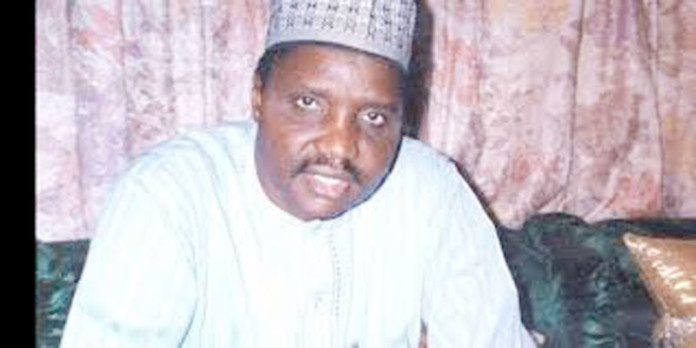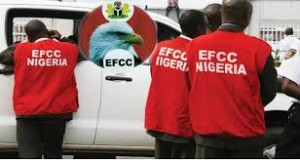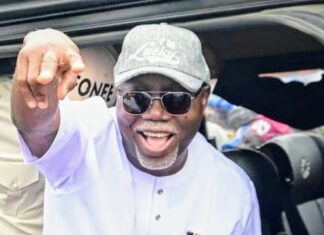The arrest, interrogation and release of the incorruptible retired Army General opens a new vista in the anti-graft war.
If he had been a thoroughbred civilian, he would most likely have been a Comrade. But Lawal Jafaru Isa is a retired Brigadier General in the Nigerian Army. He has chosen politics as a new vocation after retiring and his experiences have been chequered.
Last week, his introduction to the probe of the alleged diversion of $2.1 billion meant for arms purchase by officials of the immediate-past administration of ex-president Goodluck Ebele Jonathan change the narrative of the war against corruption by President Muhammadu Buhari.
His arrest a day after that of the National Publicity Secretary of the opposition Peoples Democratic Party (PDP), Chief Olisa Metuh, made headline news as he is a known strong ally of Buhari.
Isa’s arrest followed his refusal to honour invitation by the Economic and Financial Crimes Commission (EFCC). He had written a letter to the commission through his lawyer, seeking a postponement of his appearance date on the grounds of death of a relative. Dissatisfied, EFCC swooped on his residence in Abuja to arrest him.
Four days later, Isa was released while Metuh went on hunger strike to protest his continued detention. For many, the release of Isa was selective justice. The leadership of PDP accused the anti-graft agency of compromise and bad faith. Isa is the first chieftain of the APC to be arrested by EFCC since the beginning of the probe.
Jafaru is not a run-of-the-mill APC man. A staunch supporter of Buhari, he is seen as the President’s alter ego. He had contested for the governorship of his native Kano State twice. Once, under the Buhari-led Congress for Progressive Change (CPC) in 2011 but was defeated by the intra-party squabbles with the son of late Head of State General Sani Abacha, Alhaji Muhammad Abacha and again, in 2015 was defeated by the Kwankwasiya team in the primary won by Dr. Abdullahi Umar Ganduje, who eventually won the main election.
But acting Chairman of EFCC, Mr. Ibrahim Magu explained that while Isa coughed out N100m out of the N170m shared in the misappropriation deal, Metuh was intransigent, went on hunger strike and declined to return the N400m he shared from the same source.
Stalemate, you may say. But nothing has tasked the on-going anti-corruption crusade of the Buhari administration than the Isa saga. Initially speculated to become a frontline candidate for the Chief of Staff to the President or at the very worst, to serve as member of the kitchen cabinet of Buhari, Isa’s expectation was cut short after serving as Buhari’s eyes in the Ahmed Joda-led Transition Committee that drafted the blueprint for this government.
Isa’s comeuppance, it was gathered was his indictment by security reports linking him with slush funds and “questionable receipts” from the office of his embattled friend and former NSA, Dasuki.
But EFCC said it was not done with Isa. The commission enthused that his would be a litmus test case to assert that it would not be intimidated or stampeded by any campaign of calumny intended to detract it. After signing an undertaking to refund the remaining N70m, added Magu, Isa may still face prosecution. The question is: Will there be motivation to return monies taken, stolen or misappropriated, if repentant public officers or their acolytes are still made to face prosecution after forfeiting their loot? Perhaps, the penalty may be made lighter.
Isa, thought of as an incorruptible disciplinarian, decent and on the same page with Buhari, was Military Administrator of Kaduna State from December 1993 to August 1996 during the military regime of General Sani Abacha. In 1996, Isa created several chiefdoms for the southern Zaria or Kaduna people in order to improve peace in Kaduna State.
A prolific administrator, Isa though a Muslim, was seen in company of Christians and engendered confidence in the volatile states by participating in Christian activities. Writes Ifeanyi Nwolisa, it “was good judgment because the move ensured that Christians began to trust him and had good faith in the government to defend all lives of the citizens irrespective of ethnic background…The good intention of Lawal Jafaru Isa in uniting all residents in the state created a model for subsequent governors to follow, which is to act with urgency in any occurrence of even the slightest of crisis.” Jafaru Isa’s governance model became a roadmap for his successors.
Retired from the Nigerian Army on the 22nd of August 1996, the man in the eyes of the storm was a leading member of the newly formed Arewa Consultative Forum, a northern political lobbying group since Septmeber, 2000. He became a leader of the United Nigerian Development Forum, an association friendly to the election of General Ibrahim Babangida in the April 2003 Presidential contest. He became a director of Bank PHB.
While the probe into who gets what in what has now become known as Dasukigate continues, Nigerians wait with bated breath whether Isa will come out unscathed or whether this probe will eclipse the shinning star from Kano at the end of his trial.
-Leadership














